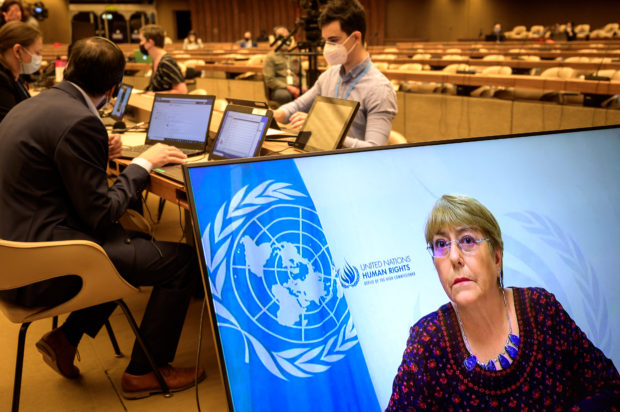At UN Human Rights Council, PH urged to end EJKs, red-tagging

United Nations High Commissioner for Human Rights Michelle Bachelet is seen on a screen delivering a speech remotely at a UN Human Rights Council. This photo was taken on May 27, 2021. (File. photo by FABRICE COFFRINI / Agence France-Presse)
MANILA, Philippines — Several member states of the United Nations Human Rights Council (UNHRC) expressed concern about the human rights situation in the Philippines on Monday, with the United States even urging an end to the state practice of Red-tagging.
At least 30 states said the Philippines should end impunity and bring perpetrators of extrajudicial killings (EJKs) to justice.
Besides the United States, Sierra Leone, Sweden, Romania, and Lichtenstein called on the Philippines to end the practice of Red-tagging, while Ireland, Estonia, Austria, France, Lithuania, and Latvia urged either cooperation with the International Criminal Court or a return to the 2002 Rome Statute which established that body.
Bayan secretary general Renato Reyes said these recommendations should be seriously considered by the government.
Subdued approach
He also noted, however, that the government “has denied that it engages in a policy of red-tagging, [saying] that the term was allegedly a mere invention of the Left ‘to protect the Left.’”
Article continues after this advertisement“This refusal will mean a continuation of this dangerous policy, to the detriment of the human rights situation in the Philippines,” Reyes said.
Article continues after this advertisementIn response, Justice Secretary Jesus Crispin Remulla, who leads the delegation, told the UNHRC the country was already tackling the problem of EJKs through the continuous filing of cases against police officers involved in the killings.
He also asserted that President Ferdinand Marcos Jr. “has set the tone” for a more subdued approach to the drug war by addressing drug use at its root.
Meanwhile, the Philippine National Police on Monday vowed that killings in antidrug operations would be minimized since the government is now focused on rehabilitation and education.
“As much as possible, we wanted a bloodless campaign,” PNP chief Gen. Rodolfo Azurin Jr. told foreign correspondents in an online forum.
While there are instances where law enforcers would have to defend themselves to ensure their safety, Azurin said, “we avoid killing of suspects.”
Azurin said the previous government’s drug war policies were being reviewed to determine if they were still relevant and to see if “certain adjustments” need to be made to make sure they remain effective and efficient.